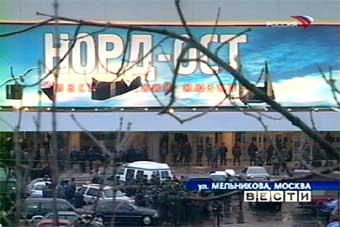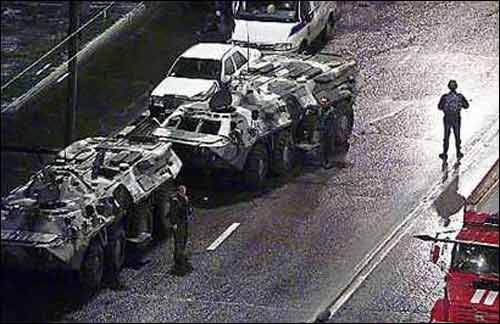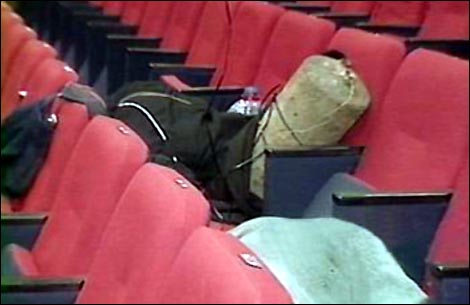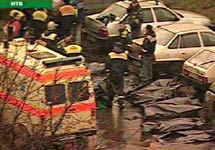Russia marks 3rd anniversary of Nord Ost hostage drama
The hostage crisis, which took place in Moscow music theatre three years ago, shocked the whole world

Today Russia marks the third anniversary of the hostage crisis, which took place in October of 2002 in the Moscow music theatre. The terrorist act, which became known in the world as the Nord Ost hostage drama  (the theater was staging the musical of the same name), lasted for 56 hours. When terrorists seized the theatre, they took 912 people hostage, including foreign citizens from 20 countries of the world. One hundred and thirty hostages died during the siege; all terrorists were killed. A lot of details about the tragedy remain unclear, whereas many try to use people's grief for their selfish political goals.
(the theater was staging the musical of the same name), lasted for 56 hours. When terrorists seized the theatre, they took 912 people hostage, including foreign citizens from 20 countries of the world. One hundred and thirty hostages died during the siege; all terrorists were killed. A lot of details about the tragedy remain unclear, whereas many try to use people's grief for their selfish political goals.
The hostage crisis began on 23 October 2002 at about 9:00 p.m. Wednesday. A group of camouflaged armed men appeared on stage in the middle of the musical performance, which used to enjoy immense popularity in Moscow before the tragedy. The viewers thought at first that the people with guns in their hands were a part of theatrical extravaganza. However, it became clear several minutes later that the music theater, situated not very far from the center of Moscow, had been seized by terrorists.
All Russian news agencies reported several hours later that a group of terrorists with warlord Movsar Barayev at the head had seized the theater with about 1,000 people inside. Suicide bombers, presumably Chechen females, who made up almost a half of the entire terrorist group, sat down along the perimeter of the hall and installed explosive devices in every corner.
The terrorists demanded the Russian government should withdraw federal troops from Chechnya, or all the hostages would be killed otherwise. They added that they would agree to release all Muslims and foreigners: the terrorists released some of the hostages indeed, although the majority of them, including Muslims and foreigners, had to remain inside. A lot of Russian political and public figures visited the site of the dramatic events, but only pediatrician Leonid Roshal and signer Joseph Kobzon managed to save a group of children from the seized theater. All children under 12 years old were subsequently released as well, along with several adult hostages.
The situation around the building of the theater was getting more intense too. Grief-stricken people outside wanted their loved one to be saved and released at all costs. President Putin canceled his official visit to Mexico and took the situation  under his control. The terrorists did not let the hostages eat, they were running out of water, all the people were extremely exhausted. The attackers killed one man and one woman to frighten everyone else sitting in the hall. The terrorists released several natives of Azerbaijan (an Asian republic of the former USSR) at night of October 25 – those people became the last group of released hostages.
under his control. The terrorists did not let the hostages eat, they were running out of water, all the people were extremely exhausted. The attackers killed one man and one woman to frighten everyone else sitting in the hall. The terrorists released several natives of Azerbaijan (an Asian republic of the former USSR) at night of October 25 – those people became the last group of released hostages.
Russian special services intercepted numerous telephone conversations, which the terrorists conducted with their sponsors abroad. It was revealed that the attackers were going to start killing the hostages on Saturday morning. There was no time left to wait, and the special services launched the storming operation at about 5:30 a.m. A group of Russian commandoes used sleeping gas to penetrate into the seized theater. All the terrorists, both of Chechen and other nationalities, were killed in the siege.
Click here to see the gallery of Russian special troops
None of the hostages were killed during the storm whereas all the bombs remained intact during the operation – hundreds of people were saved from hell. However, 130 people died either because of their physical exhaustion or drawbacks of the rescuing operation. The list of victims included citizens of Russia, Ukraine, Armenia, Azerbaijan, Moldavia, Kazakhstan the USA and the Netherlands.
The Nord Ost drama shocked Moscow, Russia and the whole world. It just so happened that a large group of well-equipped terrorists penetrated in the heart of Moscow and took almost a thousand people hostage, when they came to see a musical performance after a day at work and school. Moscow streets looked deserted, people preferred to lock themselves up in their apartments and not to go out withouta need. Alot ofMuscovites, who gathered not far from the music theater, were praying for those inside the building. The neighborhood was smothered in candles and flowers when it was all over. Christians, Muslims and people of other religions were praying for the souls of the deceased hostages.
The hostage drama in Moscow was accompanied with a court process in Copenhagen, in which spokespeople for the Chechen republic, with Ahmed Zakayev at the head, took an active participation (Zakayev was considered to be the emissary of the now-killed fugitive Chechen president, terrorist Aslan Maskhadov). The Danish authorities originally denied any connection between the hostage crisis in Moscow and the hearings in Denmark. Zakayev was eventually arrested in Denmark for a short period of time and then released again. The Chechen “emissary” went to London, which still remains the city of his residence.
 It is noteworthy that Western media persistently referred to the terrorists, who seized the music theatre in Moscow, as'rebels' or 'insurgents.' Foreign reporters blamed the Russian government for the tragedy, saying that the Russian administration refused to negotiate with Aslan Maskhadov and Shamil Basayev. There were practically no candles and hardly any flowers laid near the buildings of Russian embassies in Europe and in the United States of America, although candles and flowers could be seen everywhere after the 9/11 attacks. However, foreign people did come to Russian embassies in Prague, Rome, Paris, Berlin and Stockholm to express their sympathies and condolences.
It is noteworthy that Western media persistently referred to the terrorists, who seized the music theatre in Moscow, as'rebels' or 'insurgents.' Foreign reporters blamed the Russian government for the tragedy, saying that the Russian administration refused to negotiate with Aslan Maskhadov and Shamil Basayev. There were practically no candles and hardly any flowers laid near the buildings of Russian embassies in Europe and in the United States of America, although candles and flowers could be seen everywhere after the 9/11 attacks. However, foreign people did come to Russian embassies in Prague, Rome, Paris, Berlin and Stockholm to express their sympathies and condolences.
Many of those, who lost their loved ones in the siege, did not wish to trust official conclusions from the authorities and decided to conduct an independent investigation of their own. Several Russian oppositionists agreed to assist them in the investigation immediately.
It has recently transpired that the notorious Grigory Grabovoi offered his assistance in resurrecting the victims of the Nord Ost hostage crisis, but the story with the so-called “Messiah” did not go that public as it happened with tragedy of another hostage crisis in Beslan.
There were three central questions in the investigation of the 2002 hostage crisis in Moscow: the action of the sleeping gas, the actions of the special troops and the amount of compensations to those families, who lost their relatives in the theatre. Specialists said that the sleeping gas, which was used during the storm, could only lead to complications for people exhausted with hunger and thirst. As for the operation itself, foreign experts on anti-terrorist struggle stated that the Russian commandoes conducted a unique and ultra-difficult special operation, which yielded no casualties. The military part of the operation was successful, although it became impossible to avoid victims among the hostages.
Legal expert Igor Trunov took up the issue of financial compensations. The lawyer, who became known in Russia with the help of the Nord Ost drama, asked the Moscow authorities and the Russian Ministry for Finance to pay one million dollars to each family, whose relatives died in the theatre siege. Mr. Trunov obviously learned the experience of 9/11 terrorist attacks in the USA, when the families of  the WTC victims were paid millions of dollars of compensations. It was not the state, however, but the terrorists, who caused the hostage drama: the lawyer eventually failed to win any of such expensive cases. Mr. Trunov's colleague, Venera Kamalova, managed to win the lawsuit filed against the government of Moscow: the family of one of the deceased musicians of the Nord Ost show was paid $60,000.
the WTC victims were paid millions of dollars of compensations. It was not the state, however, but the terrorists, who caused the hostage drama: the lawyer eventually failed to win any of such expensive cases. Mr. Trunov's colleague, Venera Kamalova, managed to win the lawsuit filed against the government of Moscow: the family of one of the deceased musicians of the Nord Ost show was paid $60,000.
The Nord Ost hostage crisis shocked the world three years ago. However, a lot of questions are still open. How could such a large group of terrorists make their way to the center of Moscow? Why was the rescuing operation organized so poorly, when the exhausted people were literally piled up in buses? This way or other, but a lot of Russian politicians still speculate on other people's grief for the sake of their political objectives.
Ivan Shmelev
You can discuss this article on Pravda.Ru FORUM
Subscribe to Pravda.Ru Telegram channel, Facebook, RSS!


